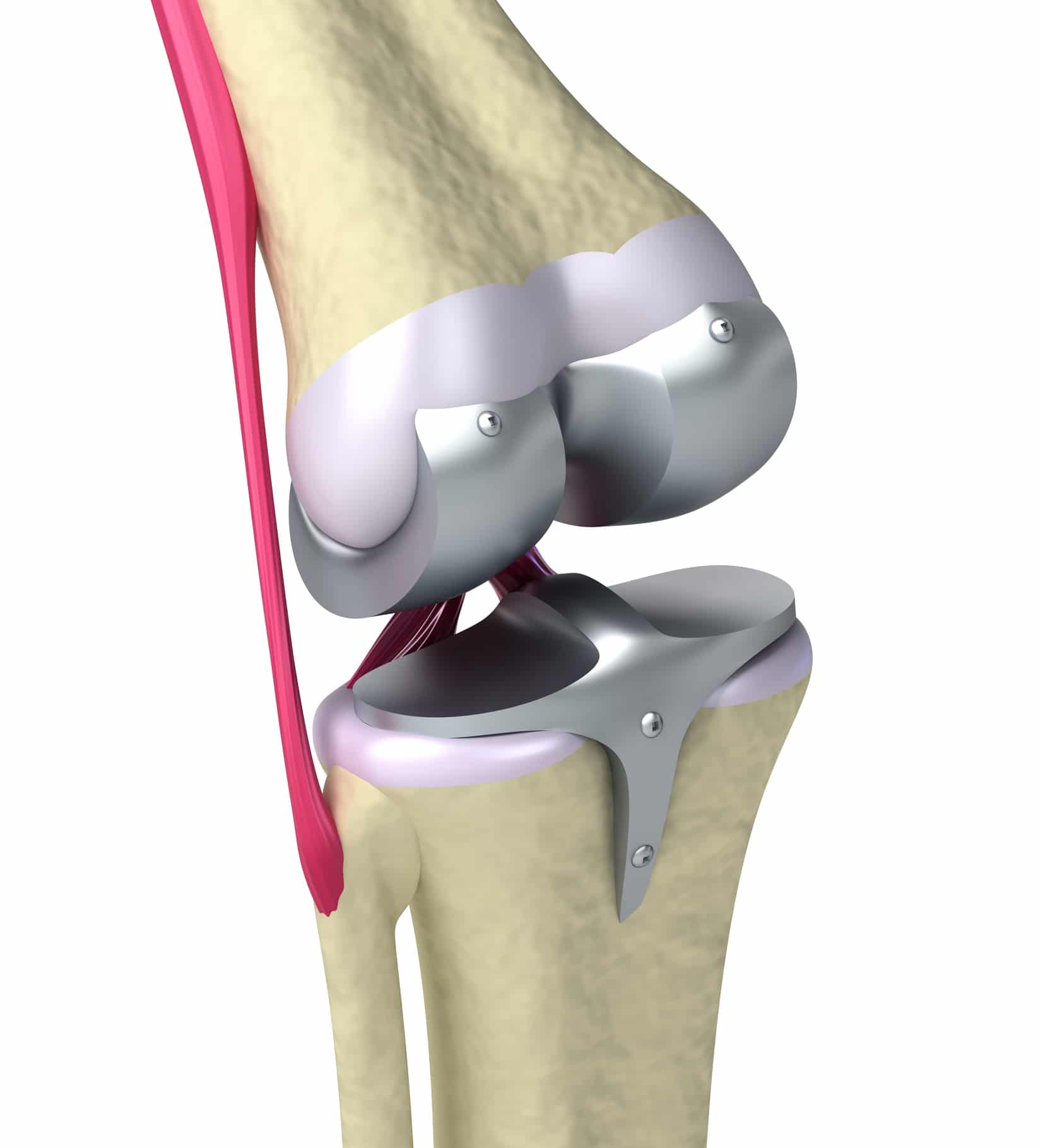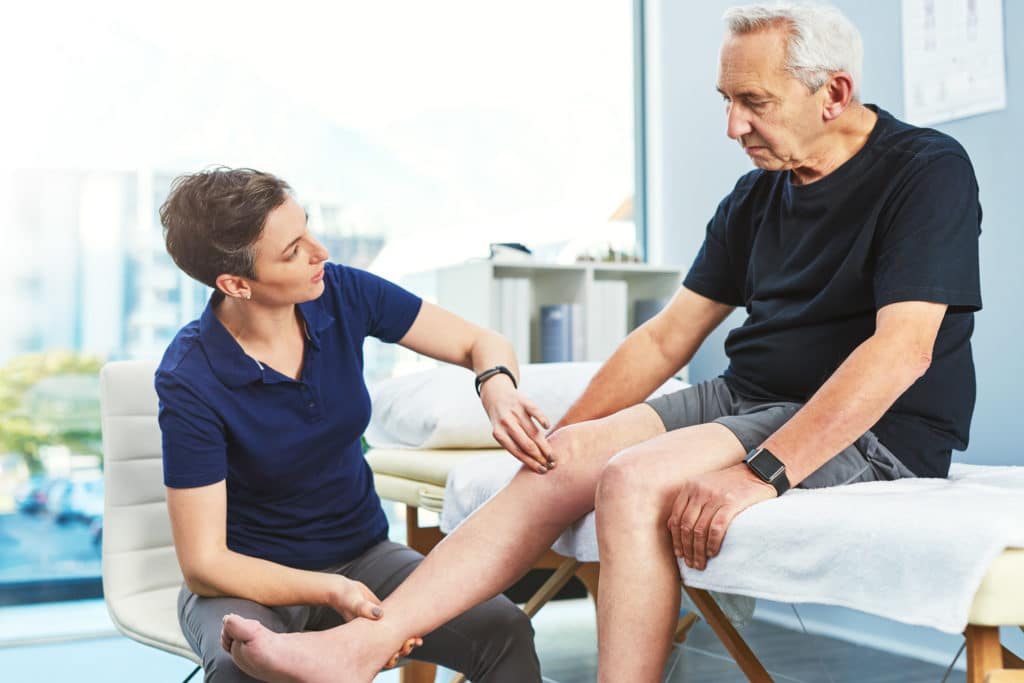If knee pain and damage are keeping you from living your life with the same independence and level of activity you once enjoyed, then total knee replacement may be the procedure you've been looking for. Our experienced and trusted surgeons can answer any questions you have regarding the procedure, and can help you determine whether you are a candidate for surgery. Call (928) 537-4375 today to schedule your personalized appointment at one of our many office locations in Arizona!
ROSA Knee Replacement
What is a total knee replacement?
In total knee replacement surgery, also known as knee arthroplasty, the damaged bone and cartilage from the patient’s shinbone, thighbone, and kneecap are cut away. An artificial joint made from metal alloys, high-grade plastics, and polymers replaces the removed areas. Now the knee can move and function again without pain.
With over 700,000 total knee replacements performed every year in the U.S., these are becoming common procedures. These numbers will continue to increase as the baby boom generation fully comes into their older years after lifetimes of activity. Whether in Show Low or Chicago, the age when patients are having knee replacement is dropping. Where these procedures were typically done at age 69 in the year 2000, a decade later that average age dropped to 66, and it has surely continued that trend.

Total knee replacement allows our Summit Healthcare patients to regain the activities they’ve had to give up due to their chronic knee pain. Many of our patients feel as if they have a new lease on life with their new knee. Their only question is, “Why did I wait so long to do this?”
What are the benefits of total knee replacement surgery?
What’s the benefit of being able to walk, play pickleball, ride a bike, play golf, or even just climb a set of stairs without pain? That’s the benefit of having our team at Summit Healthcare replace your failing knee. People often don’t realize just how much their damaged, painful knee has impacted their day-to-day life. What used to be one-hour walks with the dog now are to the corner and back. It’s too painful to go further. Chronic knee pain can have an effect not only on your physical life, precluding you from doing many of the things you formerly enjoyed, but it can also affect you mentally. Chronic pain when doing something as simple as going to the grocery store can lead to depression and it can make you pull back from family and friends.
These replacements allow our patients from Show Low and the surrounding areas to regain a normal life again after years of enduring knee pain. With success rates in the 85 to 90 percent range with knee replacement, there’s no reason to further reduce the scope of what you can do actively in your life because of knee pain.
Who would be a good candidate for total knee replacement?
The above list isn’t all-encompassing but covers the conditions where a person would be a good candidate for total knee replacement. The question is usually one of quality of life. If the pain from your degraded knee is seriously impacting your life, it’s probably time to have this surgery.
You would not be a good candidate for replacement surgery if your knee symptoms are not related to joint disease. Also, if a person is too heavy for an artificial joint to support the weight, he or she cannot have this surgery. If you have a severe illness or infection, or if you have poor or fragile skin covering your knee, that would need to improve before you could have this surgery.
How Can I Prepare For My Knee Replacement Surgery?
You will most likely arrive at the hospital on the morning of your knee surgery. Be sure to follow all of your surgeon’s instructions on preparing for surgery:
- You should stop eating or drinking 10 hours before surgery.
- If you take a daily medication, ask if you should still take it the morning of surgery.
- At the hospital, your temperature, pulse, breathing, and blood pressure will be checked.
- An IV (intravenous) line may be started to provide fluids and medications needed during surgery.

What is the procedure for total knee replacement surgery?
These procedures are performed with the patient under general anesthesia. They are relatively straightforward procedures where the damaged portions of the knee joint are removed and replaced with a prosthetic.
Your Summit Healthcare surgeon will start with an incision in the knee area, accessing the damaged joint. The incisions required in today’s knee replacements are smaller and far less invasive than those of just a decade ago. Still, this procedure involves a lengthy incision, typically from 6 to 10 inches.
Once the joint is accessed, we move the kneecap to the side and cut away the damaged joint surfaces. Then we attach the prosthetic pieces. The prosthesis consists of three parts: metal alloy parts replace the ends of the thigh bone and the shinbone. High-density plastic replaces cartilage on the shin and kneecap components. These parts are typically cemented into place.
Before we close the incision, we bend and rotate your repaired knee to ensure proper function has been achieved. The whole surgery takes about two hours.
Why should I consider having a total knee replacement?
Patients considering having a knee replaced by the Summit Healthcare team are usually at the end of their rope with their damaged knee. Conservative measures have not provided the relief they hoped for, and the pain has really begun to limit their everyday activities. Insignificant activities such as walking the dog become out of the question.
Serious, chronic pain would be first and foremost among conditions that would merit replacement. These are conditions where we would likely recommend total knee replacement:
- Severe knee pain or stiffness that limits your everyday activities, including walking, climbing stairs, and getting in and out of a chair.
- Moderate or severe knee pain even when at rest.
- Chronic knee inflammation and swelling that does not resolve with rest and medications.
- Knee deformity, such as bowing inward or outward.
- Failure to substantially improve with conservative treatments, such as cortisone injections, lubricating injections, physical therapy, and the like.
Hear What Our Patients Have to Say
"I have had two total knee replacements and I am currently lying in the hospital bed for my second one. The staff the hospital and the care has been outstanding. We are very fortunate to have this hospital and their capabilities for such rural setting. Both my husband and I consider that we could have services here on the mountain and our recovery was by far easier than if we had to travel to the valley."
What happens next after my knee replacement surgery is done?
After your knee surgery, you will be sent to the PACU (Post Anesthesia Care Unit). When you are fully awake, you will be moved to your room. The nurses will give you medications to ease your pain. An SCD (Sequential Compression Device) may be used to prevent blood clots by gently squeezing then releasing your leg.
Soon, our skilled orthopedic team will help you get up and moving.

They know precisely what they’re doing and how to help you recover, heal, and get back to life in the fastest, safest way possible. You may also have physical therapy or occupational therapy after your knee surgery.
After surgery, you will probably be hospitalized for one-to-three days. Recovery time varies following knee replacement surgery, but most people are able to drive after two weeks, garden after three-to-four weeks, and golf after six-to-eight weeks. Your doctor will tell you which activities you can return to, and when, and which activities you’ll need to avoid.
What is recovery like after total knee replacement?
There are really two parts to your recovery after total knee replacement surgery: planning for recovery and actual physical recovery.
Planning out your recovery is one of the keys to success. It needs to be done before you’ve even scheduled your surgery. You’ll want to go through your house and check some things, such as the stability of your handrails. And you’ll need to enlist help. You will be able to walk on crutches or with a walker soon after surgery, but you’ll need help around the house for several weeks with tasks such as cooking, shopping, bathing, doing laundry, and the like.
You’ll need to get your house or apartment ready for when you come home after surgery. Consider these items:
- Making sure stair handrails are secure
- Adding safety bars in the shower
- Having a stable chair at a height of 18-20 inches with a firm back, two arms, and a footstool for intermittent leg elevation
- A stable shower bench or chair for bathing
- Removing all throw rugs and loose carpeting
- A temporary recovery room on the ground floor, as walking up and downstairs will be very difficult in the early part of your recovery
In The Hospital
You’ll likely stay in Summit Healthcare for a couple of days before heading home. We’ll get you moving your foot and ankle immediately following your surgery to increase blood flow in your leg muscles to help reduce swelling and decrease the chances of developing a blood clot. We’ll have you on a medication to prevent blood clot formation and decrease leg swelling. We may also use compression hose or even an inflatable leg covering.
You will begin physical therapy the day after your surgery. Your physical therapist will teach you the specific exercises you’ll need to strengthen your leg and restore knee movement. A continuous passive motion exercise machine could be used to help with this.
At Home
We will provide you with instructions for recovery when you return home a couple of days after your surgery. You must follow these diligently, as this will largely dictate the successful return of full function in your new knee. These instructions will include wound care and bathing information.
Exercise is probably the most important part of your home care. Your activity regimen will include:
- A graduated walking program to slowly increase your mobility
- Resuming other normal household activities, such as climbing stairs
- Specific daily exercise plans that both restore movement and strengthen your knee. At first, you’ll have a physical therapist come to your home to help you with these.
- You should be able to resume most normal activities of daily living within 3-6 weeks of your surgery.

How long does it take to recover after total knee replacement surgery?
For knee replacements, the American Association of Hip and Knee Surgeons says that it can take up to 3 months to return to most activities, and 6 months to a year before your knee is as strong and resilient as it can be.
What are the risks associated with total knee replacement surgery?
As with any surgery, knee replacement surgery carries possible risks and complications. These include:
- Reaction to the anesthesia
- Blood clots
- Infection
- Dislocation of the joint
- Loosening of the prosthesis
- Fracture
- Wearing out the prosthetic
- Damage to nearby blood vessels, bones, or nerves
- Pain
Additional Knee Replacement Surgery FAQs
If you put off knee replacement the joint will continue to degrade, and your pain will worsen. This will mean your quality of life will worsen along with your knee. One way people look at the value in this is by reducing it to a mathematical formula. This is a method orthopedic surgeons use to detail the potential improvement total knee replacement can provide for a patient. Here’s how it works.
Waiting is only pushing your quality of life down for a longer period of your life. Isn’t life too short to roll the dice that way? There’s a reason over 600,000 people in the U.S. opt to have total knee replacement every year, rather than “toughing” it out and missing out on life.
How much work you’ll need to miss with total knee replacement is variable, depending upon the patient and the type of work. If you work in an office environment, you can return to work when you can safely travel to and from the site. This can be anywhere from 2-6 weeks after surgery. If at a desk job, you should try to elevate the leg as much as possible and take walks at appropriate intervals.
If your job involves more standing and walking, you can return to it when you can walk without a limp, generally between 6 to 12 weeks.
If your job involves more physical stress, it will be 10-12 weeks before you can return. This will depend on when you can safely perform your job duties.
Motion is important for your recovery. You want as much flexion (bending) and extension (straightening) as possible. It can take weeks to establish the range you need. It’s important to obtain full extension because this allows the knee to “lockout.” This reduces fatigue of the quadriceps muscles were standing for a long period of time. It also will allow the knee to function more normally when walking.
The goal with bending is to surpass 90 degrees. This can be difficult due to stiffness. Riding a stationary bike is excellent for increasing flexion. At some point, patients may need manipulation under anesthesia. Your orthopedic surgeon will do this at Summit Healthcare. This is necessary in about 2 percent of patients to release the adhesions that have formed and are preventing motion.
Sleep positions are important for at least 6 weeks. The best position is on your back with your surgical leg propped up with 2-3 pillows. Don’t put them behind your knee. You want to keep the leg above your heart. You can sleep on the opposite side of your replacement, but you cannot sleep on the repaired knee side. With your new knee up toward the ceiling, you need to keep two pillows between your legs. Keep your legs even, and don’t cross your legs ever. It is not safe to sleep on your stomach for at least 6 weeks.
You will experience pain after this surgery and during recovery, but it helps to think back to the daily, ongoing pain your degraded knee was causing you before your surgery. After your anesthesia wears off, you’ll still have a nerve block that has lasting anesthetic qualities. That will cover the first day. From there, you’ll be on narcotic pain medication taken orally or in IV form. This will likely be morphine, fentanyl, or oxycodone. They are addictive, but you’ll only be on them for a short while. Your pain should diminish relatively quickly, within 4 or 5 days at the most.
Future lingering pain is somewhat dependent upon you. If you follow your physical therapy diligently and make some lifestyle modifications to eliminate areas of impact, your future pain should be minimal, especially compared to your pre-surgery levels of pain.
Our knee replacement patients from Show Low and the surrounding areas are excited by the feeling of freedom after having this surgery. That’s because their knee pain was causing them to have to miss out on more and more activities such as hiking or even walking around the block.
You’ll be walking at just 1 to 3 weeks, but you’ll use a walker. From there you’ll move to crutches, and then a cane. In 4-8 weeks, you should be walking without support.
Many people equate “activities” with sports. Here are some dos and don’ts moving forward.
Call Today For Total Knee Replacement In Show Low, AZ!
To learn more about total knee replacement surgery and how it can change your life, contact us today to schedule an appointment. Dial (928) 537-4375 to speak with our medical staff, or fill out the form in our contact page by clicking here! Our practice looks forward to serving you!
